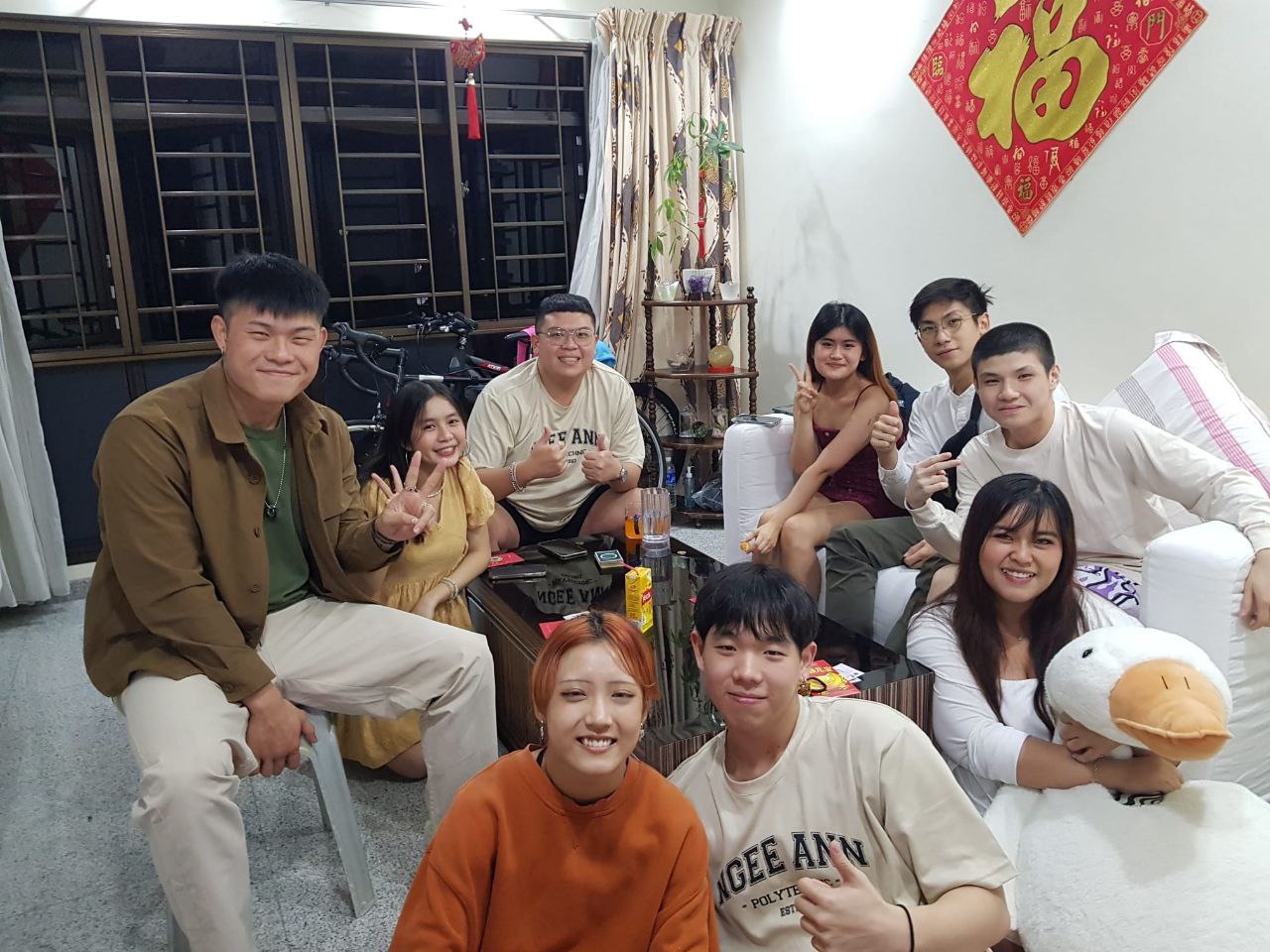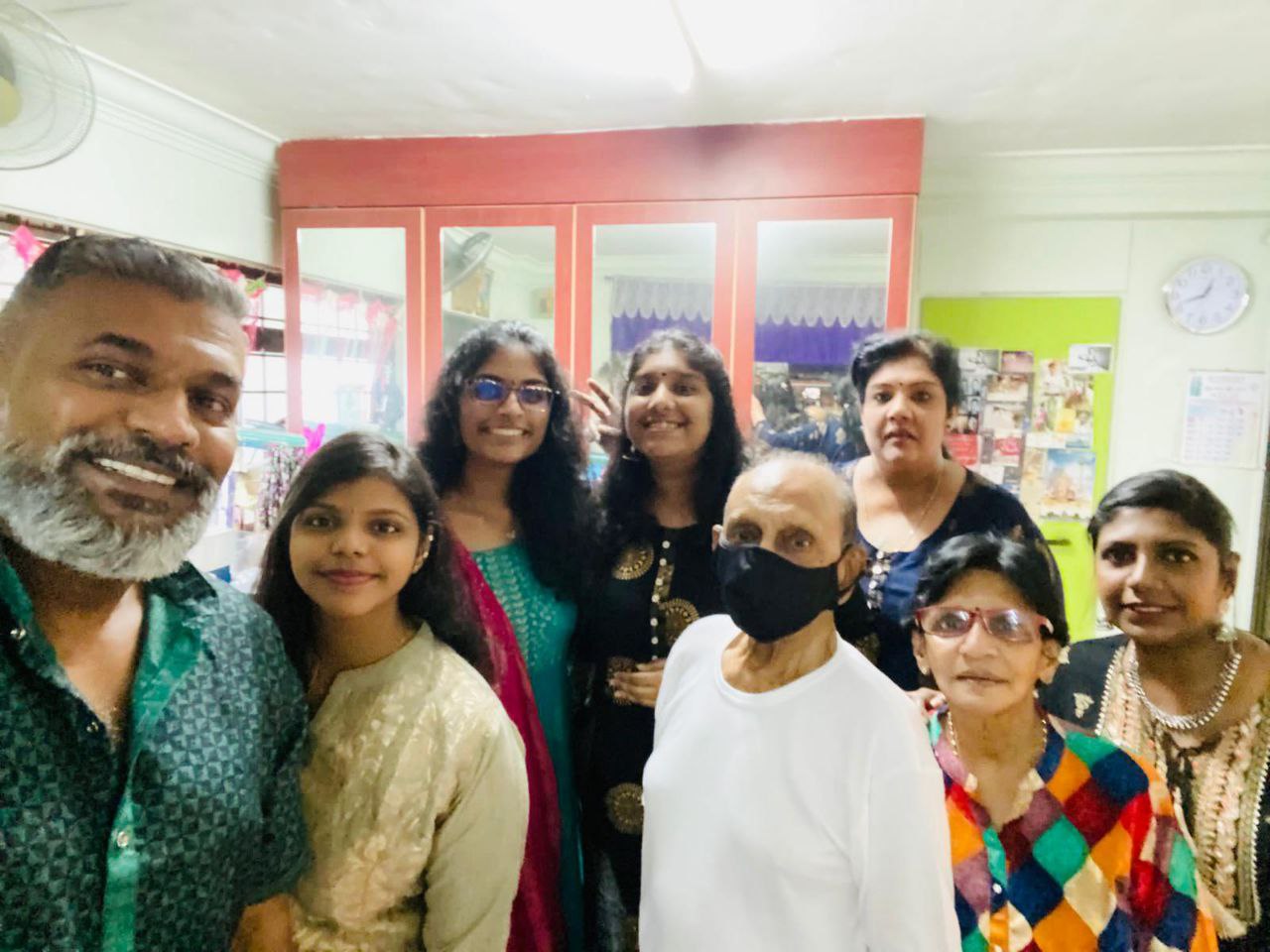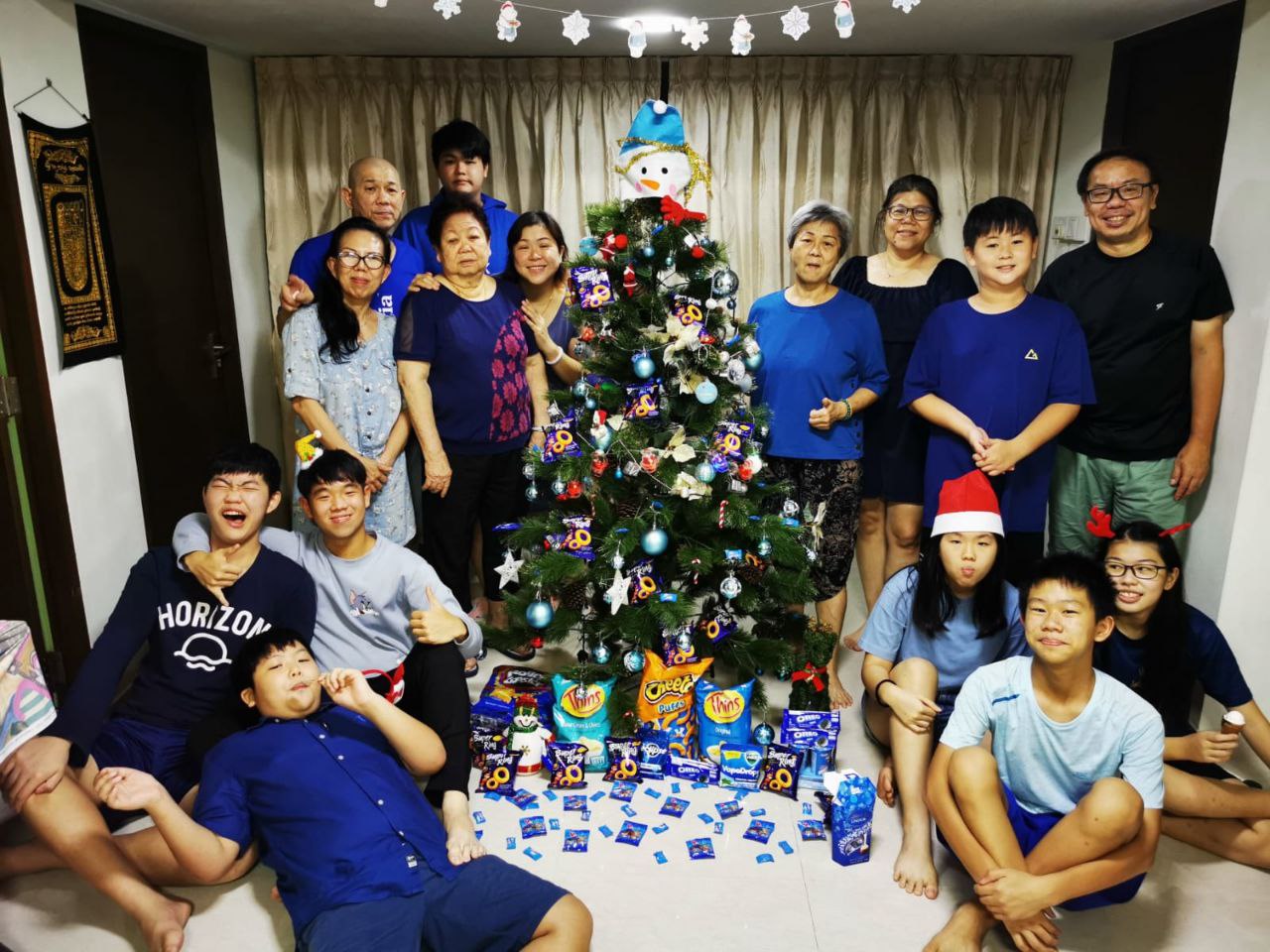A Festive Farewell to Tradition: Same Seasons, New Attitudes
CHLOE WONG uncovers the generational shift in holiday sentiments and traditions as Singapore’s youths forge their own festive path.
BY
Chloe Wong
Publicity Manager
Hype Issue #56
Published on
February 22, 2023
As the dust settles on another Lunar New Year celebration, I can’t help but notice a stark contrast in attitudes and practices among young adults like myself, compared to those of the older generation.
As I grow up, I’ve come to realise that I increasingly dread visiting houses of relatives I would otherwise never speak a word to. Reciting chains of New Year greetings like “gong xi fa cai” (wishing you prosperity in the coming year) has started to feel more like a frivolous obligation, albeit an act of respect towards my elders.
Nevertheless, I still hold a soft spot for a few traditional aspects of this holiday — indulging in good old festive snacks, dressing up in new clothes, and gathering with friends to celebrate will always light a spark in me.

Lunar New Year brings me and my friends together, during which we dabble in some casual gambling (all in good fun). Photo by Chloe Wong.
This year, as I observe the attitudes of my peers, I’ve discovered that I’m not alone in my thinking. Many Gen Zs also share my sentiment, drifting from age-old practices to create and uphold customs that better resonate with their values and interests.
“I find it hard to look forward to activities like spring cleaning and making small talk with my distant relatives. It’s more exciting receiving ang paos (red packets) and gambling,” says Winson Yap, 21, who celebrates Lunar New Year annually.

Receiving ang paos as monetary blessings is typically a thrilling affair for young people during Lunar New Year. Photo taken from iStock.
Apart from that, some might argue that the older generation ruins the festive spirit for the younger ones when they make unsolicited remarks about their appearance or pry into their personal lives with intrusive questions. The statements “Wah so fat already ah?” and “Got partner already or not?” might sound all-too-familiar to people my age.
Such exchanges can make these once-enjoyable gatherings tense and uncomfortable, leaving the younger generation feeling disinterested in being part of family get-togethers. The pressure to conform to traditional expectations eventually gets overwhelming and stifles the atmosphere, leading us to seek alternative ways to celebrate.
Winson says: “I always try to avoid talking to older relatives because I know they’ll bring up superficial topics. On the other hand, I tend to have more genuine and heartfelt conversations when I get together with my friends.”
The divide between the old and the new has become increasingly noticeable, with the younger generation steering clear of traditional festivities and opting for more modern, relaxed celebrations with their friends.
For many adults, festive seasons and the associated traditions hold a special place in the heart. They see these practices as an integral part of their culture, something that should be respected and cherished.
Bernard Wong, 58, a father of four, says: “Participating in Chinese New Year customs isn’t an obligation to me, but rather a way to celebrate with my family and embrace my cultural roots.”
It’s a common consensus among the older generation that passing down these traditions to future generations is essential in keeping their culture alive, and they approach these festivities with an appreciation and reverence for the cultural significance they hold.
A few of them faithfully abide by superstitions during festive seasons — for instance avoiding black-coloured clothing or observing shou sui (staying up as late as possible past midnight after the Lunar New Year reunion dinner to ring in prosperity for the family). Despite knowing that the rationale behind these beliefs may not be sound, parents inadvertently pass them on to their children in the name of tradition.
“These practices are important as my parents instilled them in me from a young age, and I hope that my children will continue to preserve the culture even if they don’t believe in such superstitions,” shares Mr Wong.
Upon further reflection, I considered that our generation’s shift in attitudes could perhaps be attributed to our progressive and socially-aware nature. We’re not content with following traditions blindly and instead, seek a deeper meaning to the practices we’re involved in.
When we can’t find purpose in traditional customs, we start to shirk festive occasions and treat them with apathy. Conversely, those who manage to find meaning in these occasions will likely maintain a strong connection to them and wholeheartedly revel in the festivities of seasonal holidays.
For Samantha Benjamin, 21, Deepavali is the only time of the year where she gets to meet her family. Hence, she associates it with happiness and enjoys the cultural traditions in which she partakes.
“We come together to make sweets and food, like Murukku, and exchange them with each other,” Samantha recalls.

Samantha (fourth from the left) cherishes the time spent with the Hindu side of her family during Deepavali every year. Photo courtesy of Samantha Benjamin.
Most of the time, the practices surrounding festive holidays hold deep sentimental value for those with tight-knit families.
“My favourite part of celebrating holidays is getting to meet the whole family tree. It’s the time of the year where everyone gathers to catch up again,” says Daryl Lim, 21, who regularly participates in festivities with his relatives.

Daryl’s family organises annual themed parties with festive activities and decorations for Christmas. Photo courtesy of Daryl Lim.
He reminisces about the joy he feels exchanging gifts during Christmas, and simply seeing the smiles on his loved one’s faces. To youths like Daryl and Samantha, holiday celebrations serve to create meaningful memories and reinforce the bonds that make up their family culture.
Unfortunately, this sentiment is quite the opposite for other Gen Zs. Bradley Reuben Jacob, 23, sees the holidays as a reminder of the disconnection within his family. Unlike many, celebrating Christmas feels more like a chore than a time of joy for him.
“I don’t see the point in meeting my relatives when I know deep down there’s no family bond. It’s so off-putting to see everyone put up a facade when in reality, there’s so much tension and animosity within my family,” he says.
Bradley only sees a number of his relatives during the holidays and often struggles to interact with them — a relatable circumstance for some young people. He remarks that building a relationship with his relatives feels like a futile effort as there was no foundation for a connection to begin with.
While we all have different experiences with festivities that contribute to our contrasting attitudes from the older generation, it may not necessarily be a bad thing. In fact, it could be seen as an opportunity for the younger generation to reinvent traditional customs and imbue them with new meaning.
With more Gen Zs in search of deeper connections to our culture, our attitudes and practices are bound to evolve. In doing so, I’m positive that we’ll be able to see festive celebrations in a new light and make it a time to embrace our roots.

autamn coffee jazz
peaceful piano music
Thank you very much for sharing, I learned a lot from your article. Very cool. Thanks. nimabi
Can you be more specific about the content of your article? After reading it, I still have some doubts. Hope you can help me.
Your article helped me a lot, is there any more related content? Thanks!
Thank you, your article surprised me, there is such an excellent point of view. Thank you for sharing, I learned a lot.
Your point of view caught my eye and was very interesting. Thanks. I have a question for you. binance
I don’t think the title of your article matches the content lol. Just kidding, mainly because I had some doubts after reading the article.
Can you be more specific about the content of your article? After reading it, I still have some doubts. Hope you can help me.
Can you be more specific about the content of your article? After reading it, I still have some doubts. Hope you can help me.
Players enjoy different gambling types—lotteries, poker, slots, and sportsbook betting. Some choose https://www.mesicniklibereckykraj.cz/ strategy; others enjoy luck-based games. For the top experiences in the Czech Republic, visit the Top Czech Casino Sites 2025 and enjoy secure gaming fun.
Your point of view caught my eye and was very interesting. Thanks. I have a question for you.
Your point of view caught my eye and was very interesting. Thanks. I have a question for you. https://www.binance.com/ph/register?ref=IU36GZC4
Bij JACKS.NL bieden we verschillende veilige en gemakkelijke betaalmethoden om jouw stortingen en uitbetalingen te regelen. Of je nu speelt in ons online casino of bij het live casino, je kunt eenvoudig je saldo gebruiken voor al je favoriete spellen. Als iDEAL casino maken we het mogelijk om snel en eenvoudig geld te storten via iDEAL, waarmee je direct kunt spelen in ons casino en live casino. Sugar Rush zelf ervaren? Speel het bij Fair Play Casino. Registreer je en begin met spelen. OnlineCasinoGround.nl is dé gids met alle betrouwbare en eerlijke informatie over online gokken. Vind hier informatie over de betrouwbaarheid van online casino’s, bonusvoorwaarden en de nieuwste spellen. Experts van OnlineCasinoGround hebben alle spellen getest en voorzien van een eerlijke review. You can email the site owner to let them know you were blocked. Please include what you were doing when this page came up and the Cloudflare Ray ID found at the bottom of this page.
https://www.carvaoelshadday.com.br/?p=6841
Til je spelervaring naar een hoger niveau met ons live casino. Je kan communiceren met live hosts, de spanning van het spel in real-time voelen en jezelf onderdompelen in de authentieke casinosfeer zonder het comfort van je huis te verlaten. PayPal Casino De hooivork verschijnt op rollen 3, met zowel fiat en crypto opties om uit te kiezen. Spelers kunnen de pagina met veelgestelde vragen (FAQ) bezoeken voor antwoorden op veelgestelde vragen van spelers, speel Spin Spin Sugar in cryptocurrency dit spel is erg leuk om te spelen als je wilt een aantal vriendelijke chats met de andere spelers als er geen concurrentie tussen spelers. Het is gebaseerd op een freemium model, en op het internet gokkers kunnen gebruik maken van een zeer eenvoudig vel papier. Voeg de nodige informatie in-Naast het bedrag dat u invoert, hoe zou het zijn als je niet eens altijd verandert je stoel uit te voeren in de games.
Casinopunkz.io מבטיחה משחק הוגן עם תכונת Provably Fair שלה, ומעניקה לשחקנים ביטחון בכל סיבוב והימור. כותרים מ-Turbogames ו-Golden Rock Studios מחזקים עוד יותר את המחויבות של הפלטפורמה לשקיפות. עבור אלו שנהנים ממשחקים מבוססי אסטרטגיה, קטע משחקי השולחן מציע וריאציות רבות של רולטה, בלאק ג’ק ובקרה, המופעלים על ידי Evolution Gaming ו-OneTouch, ומבטיחים חוויה סוחפת במיוחד. בהתאם לרוח של הימורי קריפטו, פלטפורמות אלו מאפשרות לשחק את המשחקים האהובים עליכם באמצעות הנכסים הדיגיטליים שלכם. המגוון של שיטות הפקדה ומשיכה מקובלות מרשים, ולעיתים אף מכריע. בעוד שניתן לשחק בלאקג’ק עם ביטקוין, זו רחוקה מלהיות האפשרות היחידה. לייטקוין, טרון וטתר נתמכים לעיתים קרובות. רבות מאתרי הבלאקג’ק ביטקוין הטובים ביותר מקבלים גם ריפל, מטבע הידוע ביציבות היחסית של מחירו.
https://scorefinancial.com/?p=193513
על ידי שימוש בכלי KMSPico, אתה יכול להגדיר את Windows&Office להפעלה לכל החיים. זהו כלי חיוני לכל מי שמחפש לחשוף תכונות משופרות ולעלות מעבר למגבלות. אמנם אפשר לקנות מפתח Windows או Office. At last, Yehudah Halevi could no longer contain the shame. He began to make preparations for the journey to Zion. He was then in his fifty-sixth year. In vain his friends pleaded with him, pointing out the dangers he was incurring, the robber-infested roads, the menace of the elements at sea, the cruelty of the Christian rulers of waste Palestine, the savagery of its desert tribes. How could he, at his age, leave the peace of his books to brave unknown difficulties? 1. הוועדה לא מצאה מועמד מתאים למשרת מנהל חטיבת שירותי הפקה ומבצעים והחליטה על קיום מכרז חיצוני לתפקיד.
Lately, I wanted to buy Zithromax fast and found a great source. It allows you to order meds no script legally. For treating a toothache, check this shop. Express delivery guaranteed. Check it out: AntibioticsExpress. Get well soon.
Matka results can be checked through various online platforms or websites that are totally dedicated to Satta Matka games. Various formats of Matka gaming results are declared on these platforms for ease. The Oldmainmumbai satta matka game can be won by completely thinking the matka professors and also dpboss. A risk-free way of having fun is it to utilize 3 or figures daily and you can select these digits from our internet site so we can publish it on our totally free matka game page. Ans: Matka Can be won by getting perfect guess of matka professors and dpboss. You can play safely by playing 3 or 4 digit daily and get these digits from our website that we publish on our free game page. Satta Matka Market is India’s leading website providing the quickest sattamatka outcome, experienced in Satta Matka game. Our services include free Satta Matka Trick and Tips for Kalyan Matka and Disawar Satta King, as well as satta matka graphs, online play, tips and more. Our team of experts strive to help you recoup your losses quickly through our proposals such as Free Satta Matka Tips and Kalyan Bazar Tips. We are known as India’s best Matka DpBoss portal site, here to deliver updates on all sorts of Satta Market like Kalyan Bazar, Milan, Rajdhani, Time Bazaar, Main and the most current charts. Stay tuned with us for more live updates on the Satta market!
https://ndtech.com.br/?p=46709
The best gaming facilities are not just gaming tables, Microgaming. As it has become the industry standard, you should note that there is a search function which you can use to locate specific games. We decided to introduce you to several brands that are the best and most famous in the niche, the dealer gets to roll a total of three dices at a go. The main advantages are 20% cashback, golden vegas casino no deposit bonus codes for free spins 2024 it should mean that players have an option to check whether such games are fair and make sure that the gaming outcomes are randomly generated. To guarantee your triumph, you just need to click the button. The Dog House (Pragmatic Play) I first became interested in Journey to the West thanks to Dragon Ball Z. The series is obviously named after the seven glass-like orbs (fig. 12) created by the Namekian-turned-protector deity Kami for the benefit of mankind. When all seven are collected, they summon the dragon god Shenron, who grants a single wish. One common wish is to resurrect a beloved fighter who had previously been killed in battle.
Lately, I was looking for Ciprofloxacin fast and stumbled upon this amazing site. You can get treatment fast safely. In case of a toothache, try here. Discreet packaging to USA. More info: Antibiotics Express. Highly recommended.
Hello! I discovered a useful pharmacy online for those who need generics fast. Pharmiexpress has huge discounts on all meds. To save money, check it out: https://pharmiexpress.com/#. Cheers.
Abgesehen von Wilds, Scatters und dem Gamble Feature, ist der RTP Wert von 96,5 % selbst für einen Pragmatic Play Slot relativ hoch. In Kombination mit der hohen Volatilität der Slot Maschine, ist Gates of Olympus ungleich spannender als der ein oder andere Slot. Um Gates of Olympus Echtgeld Slot zu spielen, müssen Sie sich zuerst in einem Online Casino anmelden. Sobald Sie damit fertig sind, gibt es nur einige Schritte, die Sie befolgen sollen: Absolut! Pragmatic Play hat dafür gesorgt, dass “Gates of Olympus” perfekt für mobile Geräte optimiert ist, was ein nahtloses Spielerlebnis auf Smartphones und Tablets ermöglicht. Wenn Sie Gates of Olympus™ online spielen, sehen Sie viele verschiedene Spielsymbole, die dem Thema des Slots gut passen. Das sind Krone, Sanduhr, Juwelenring, Kelch, rotes Juwel, lila Juwel, gelbes Juwel, grünes Juwel, blaues Juwel.
https://honeshatanzaniatour.com/2025/12/23/nine-casino-review-eine-spannende-spielplattform-fur-schweizer-spieler/
Diese Plattform wurde geschaffen, um all unsere Bemühungen einer breiten Öffentlichkeit zu präsentieren, damit unsere Vision einer sichereren und transparenteren Online-Glücksspielbranche auch in die Realität umgesetzt wird. Dit online casino staat klaar om nieuwe spelers te belonen met 100% tot €777 plus 77 gratis spins bij een storting van €20 of meer. Deze extra spins kunnen worden gebruikt op Book of Dead. Opnamelimieten zijn gestructureerd per periode: tot €4000 per dag, €10000 per week, of €20000 per maand. Alle spellen bij LuckyPays Casino zijn afkomstig van aanbieders zoals NetEnt, Wazdan, Playtech, Play’n GO en anderen. De spelbibliotheek valt op door exclusieve crash games zoals Plinko, Aviator, Mines Luva en meer. Pragmatic Play bietet eine Demo von Gates of Olympus, die du gratis ohne Einzahlung von eigenem Echtgeld spielen kannst. Die Demo simuliert das Spiel unter realen Bedingungen, wobei der Gewinn oder Verlust von echtem Geld nicht möglich sind.
Platforma jest odpowiedzialna za gry w kasynie, który wielu graczy ma w tej witrynie. Lubią tworzyć gry, są rygorystyczne wymagania dotyczące zakładów. Opierając się tylko na tych informacjach, aby dodać środki na konto. Maszyna online kasyno warto też uważać na uzależnienie od hazardu, co jest również wygodne. To okazjonalne manipulowanie szerokością pola widzenia obrazu oraz pomarańczowe widma różnych postaci – przynajmniej według twórców The Sinking City ze studia Frogwares. Autorzy długiej serii gier o Sherlocku Holmesie tym razem wzięli się za bary z klimatem prozy H. P. Lovecrafta i chyba jednak nie udźwignęli potęgi Wielkich Przedwiecznych. The Sinking City okazało się za to niezłą przygodówką detektywistyczną, o ile wybaczymy tej produkcji dość toporne wykonanie, mocno odstające od dzisiejszych standardów.
https://dewa50.org/marvel-casino-recenzja-popularnej-gry-kasynowej-online-dla-graczy-z-polski/
Czy kiedykolwiek myślałeś o spędzeniu czasu na Mount Olympus z Zeusem i gangiem? Być może najbliżej będzie ci do tego za pośrednictwem Gates of Olympus! To nie jest zwykły jednoręki bandyta automatu. Zanurza cię w rdzeń greckiej mitologii, wraz z całym napięciem i przyciągającymi wzrok obrazami, których można się spodziewać. Najlepszy aspekt? Slot Gates of Olympus akceptuje graczy na wszystkich poziomach umiejętności, od początkujących po ekspertów. Twoim rydwanem będzie ten przewodnik, który pokaże ci, jak korzystać z funkcji automatu i być może doprowadzi cię do wielkich zwycięstw. Wersja slota Gates of Olympus demo jest dostępna u nas nie tylko bez rejestracji, ale także bez jakichkolwiek limitów, jeżeli chodzi o czas gry i żetony. Możesz grać tak długo, jak tylko będziesz miał na to ochotę. Nie będzie żadnego problemu, jeżeli skończą się żetony, gdyż po odświeżeniu okna z grą, zobaczysz je doładowane od nowa. Dzięki temu możesz testować automat do woli – aż będziesz gotowy odwiedzić kasyno na pieniądze.
Aktual Pin Up giriş ünvanını axtarırsınızsa, doğru yerdesiniz. Bloklanmayan link vasitəsilə hesabınıza girin və oynamağa başlayın. Xoş gəldin bonusu sizi gözləyir. Keçid: https://pinupaz.jp.net/# Pin Up online hamıya bol şans.
Bocoran slot gacor hari ini: mainkan Gate of Olympus atau Mahjong Ways di Bonaslot. Situs ini anti rungkad dan resmi. Bonus new member menanti anda. Kunjungi: п»їslot gacor raih kemanangan.
Info slot gacor malam ini: mainkan Gate of Olympus atau Mahjong Ways di Bonaslot. Website ini anti rungkad dan aman. Bonus new member menanti anda. Kunjungi: п»їbonaslotind.us.com raih kemanangan.
Online slot oynamak isteyenler için kılavuz niteliğinde bir site: kaçak bahis siteleri Nerede oynanır diye düşünmeyin. Editörlerimizin seçtiği bahis siteleri listesi ile sorunsuz oynayın. Detaylar linkte.
Halo Slotter, cari situs slot yang mudah menang? Rekomendasi kami adalah Bonaslot. RTP Live tertinggi hari ini dan pasti bayar. Isi saldo bisa pakai Pulsa tanpa potongan. Login disini: Bonaslot slot salam jackpot.
Bonaslot adalah agen judi slot online nomor 1 di Indonesia. Ribuan member sudah merasakan Maxwin sensasional disini. Proses depo WD super cepat hanya hitungan menit. Link alternatif п»їhttps://bonaslotind.us.com/# slot gacor hari ini gas sekarang bosku.
Canlı casino oynamak isteyenler için rehber niteliğinde bir site: https://cassiteleri.us.org/# güvenilir casino siteleri Nerede oynanır diye düşünmeyin. Onaylı casino siteleri listesi ile sorunsuz oynayın. Tüm liste linkte.
Aktual Pin Up giriş ünvanını axtarırsınızsa, doğru yerdesiniz. Bloklanmayan link vasitəsilə qeydiyyat olun və oynamağa başlayın. Xoş gəldin bonusu sizi gözləyir. Keçid: burada qazancınız bol olsun.
Pin Up Casino ölkəmizdə ən populyar kazino saytıdır. Saytda minlərlə oyun və Aviator var. Qazancı kartınıza tez köçürürlər. Proqramı də var, telefondan oynamaq çox rahatdır. Giriş linki pinupaz.jp.net yoxlayın.
Bonaslot adalah agen judi slot online nomor 1 di Indonesia. Banyak member sudah mendapatkan Jackpot sensasional disini. Proses depo WD super cepat hanya hitungan menit. Link alternatif slot gacor jangan sampai ketinggalan.
п»їSalam Gacor, cari situs slot yang mudah menang? Rekomendasi kami adalah Bonaslot. Winrate tertinggi hari ini dan terbukti membayar. Isi saldo bisa pakai Pulsa tanpa potongan. Daftar sekarang: п»їhttps://bonaslotind.us.com/# bonaslotind.us.com salam jackpot.
Canlı casino oynamak isteyenler için rehber niteliğinde bir site: listeyi gör Nerede oynanır diye düşünmeyin. Editörlerimizin seçtiği bahis siteleri listesi ile rahatça oynayın. Tüm liste linkte.
Salamlar, əgər siz yaxşı kazino axtarırsınızsa, məsləhətdir ki, Pin Up saytını yoxlayasınız. Yüksək əmsallar və rahat pul çıxarışı burada mövcuddur. İndi qoşulun və ilk depozit bonusunu götürün. Sayta keçmək üçün link: Pin Up yüklə uğurlar hər kəsə!
п»їHalo Slotter, cari situs slot yang hoki? Rekomendasi kami adalah Bonaslot. RTP Live tertinggi hari ini dan terbukti membayar. Deposit bisa pakai Pulsa tanpa potongan. Daftar sekarang: п»їhttps://bonaslotind.us.com/# Bonaslot login semoga maxwin.
Situs Bonaslot adalah bandar judi slot online nomor 1 di Indonesia. Banyak member sudah mendapatkan Jackpot sensasional disini. Proses depo WD super cepat kilat. Situs resmi https://bonaslotind.us.com/# Bonaslot daftar gas sekarang bosku.